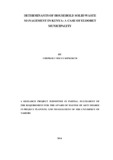| dc.description.abstract | Waste management has been important since time immemorial. With the unprecedented increase in population worldwide, especially in Sub Saharan Africa, waste management has been vital for good health, good environment and aesthetics of its towns and cities. This research intended to study determinants of household solid waste management in Kenya; a case of Eldoret municipality and it focused on the following objectives:- how income of urban households influenced solid waste management in Eldoret Municipality, how location of urban households influenced solid waste management in Eldoret Municipality, how infrastructure influenced solid waste management in Eldoret Municipality and how generation of solid waste influenced solid waste management in Eldoret Municipality. The research design was survey. The target population of this study was 45 684 households within Eldoret Municipality. The sample size is 146 households which included 13 solid waste experts from the municipality. This was categorized into nine locations/estates within Eldoret Municipality as per The Kenya National Bureau of Statistics Census 2009 Population Census. The researcher used stratified sampling method (proportionate) because it was the most convenient. Data collection instruments for this research were questionnaires, interviews and observation. Validity of research instruments was established by consulting experts from the department and colleagues. The researcher employed the test and retest method to establish reliability of the research instruments. The researcher used both qualitative and quantitative methods to analyze data. The quantitative method to be employed was use of tables and percentages. The data was analyzed using descriptive and inferential statistics techniques. A relationship between them was established. The researcher used Statistical Packages for Social Science (SPSS). The findings of this research are that level of income, location and infrastructure determined household solid waste management in Eldoret Municipality. The findings of this research indicated that there was need for household solid waste management in the municipality to be conducted without bias between high income areas and low income areas because most low income households found municipal household solid waste collection to be expensive. Locations further away from the town centres were ignored in household solid waste management in the municipality compared with locations near the town centre which were given more attention and infrastructure greatly influenced solid waste management in the municipality in that culmination of poor road network, insufficiency of sewerage facilities and poor housing development in low income areas greatly impeded household solid waste management in the municipality. Most households in the municipality were satisfied by the rate of solid waste collection which was once in a week. The recommendations in this research centered on free household solid waste management service in low income areas, strict enforcement of by-laws, improved infrastructure, construction of low cost housing, creation of awareness and integrated solid waste management system. | en_US |

